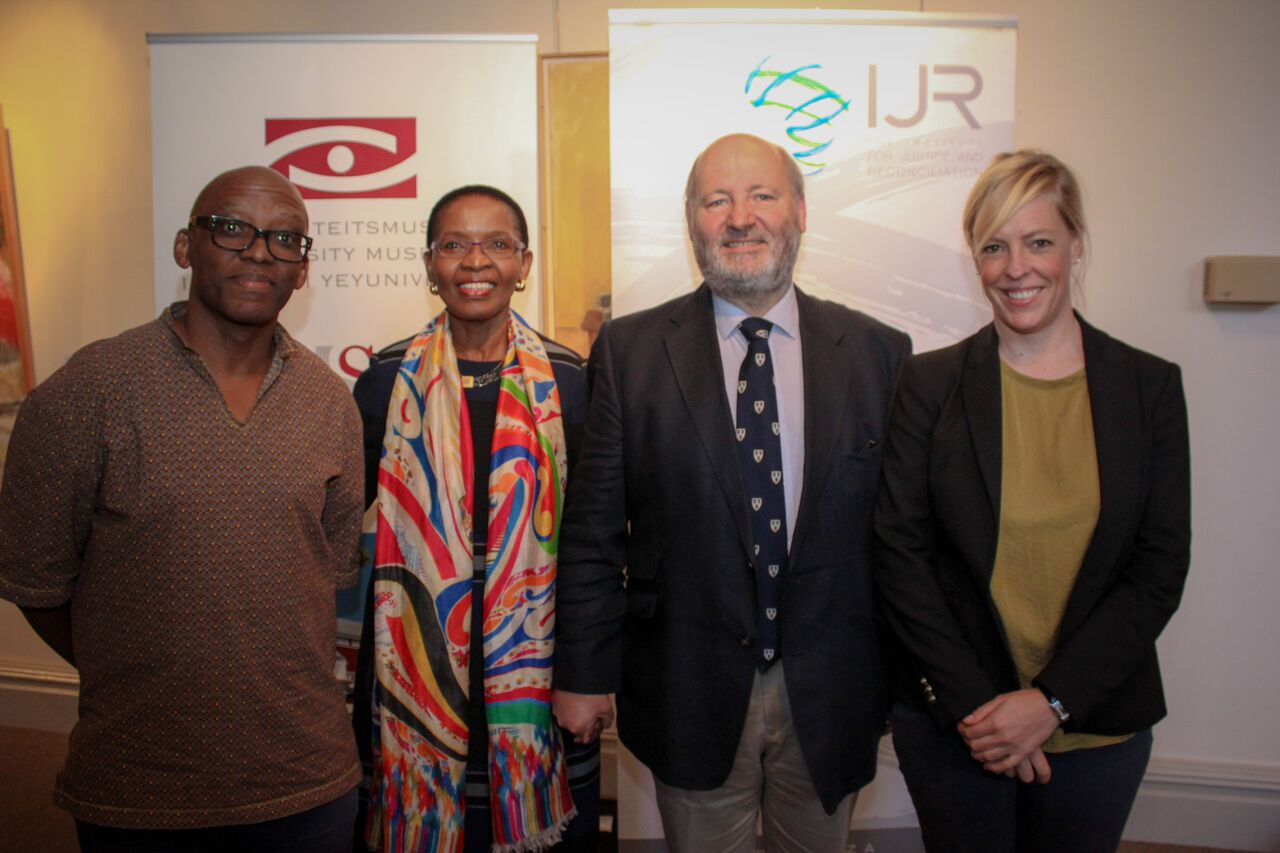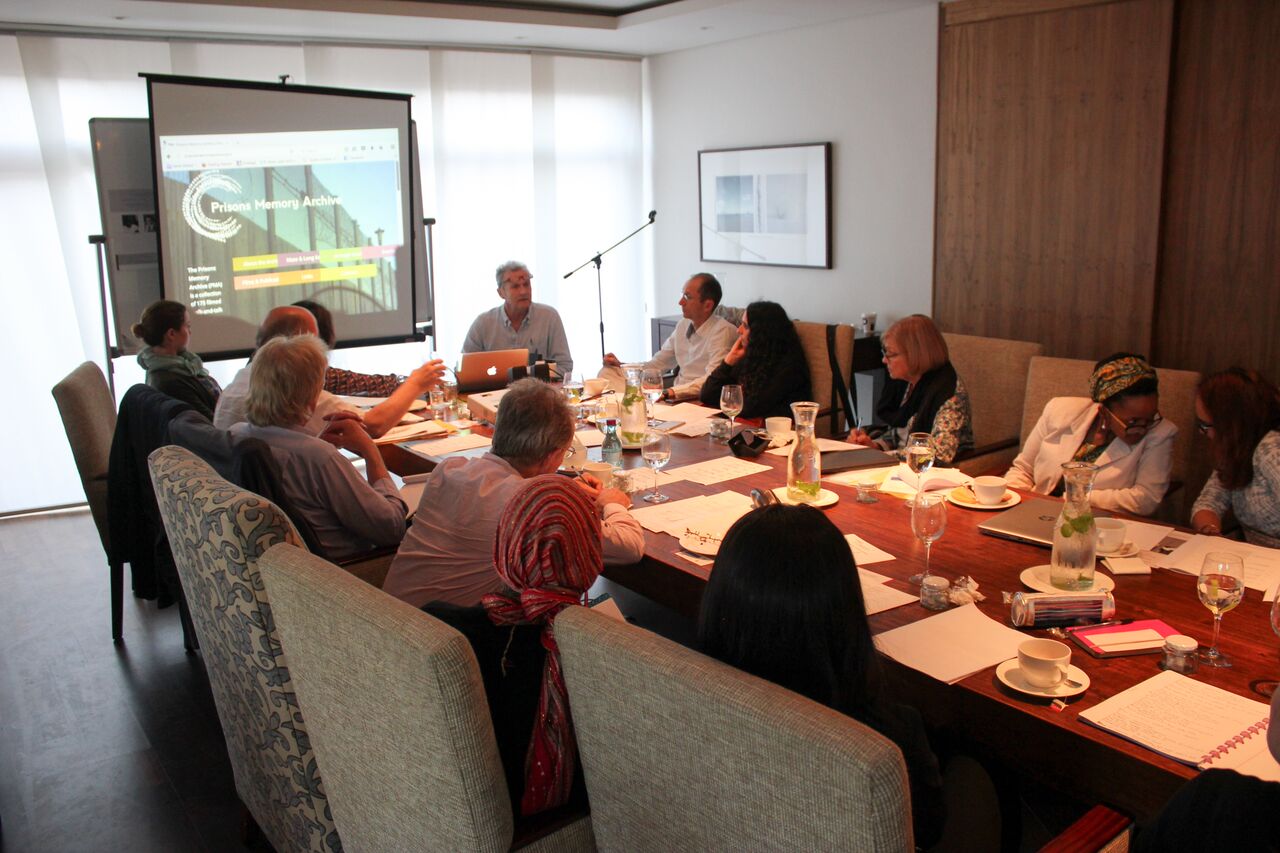SEMINAR SERIES
Transgenerational Trauma and Transformation
MAY 8
The seminar's theme this year is
Legacies of Violence, Social Change and Transformation. The
seminar explores the interplay of traumatic histories, civic life,
social justice and the arts. Invited speakers in the series are drawn
from an interdisciplinary, South African and international group of
scholars .
Reconfiguring the Legacies of Racialized Trauma.
Professor Maurice Apprey, Department of Psychiatry and Dean of African-American Affairs, University of Virginia, USA.
Time: 12h00 - 13h15
Venue: STIAS Wallenberg Centre 10 Marais Road – Stellenbosch. Auditorium 1 (New Venue).
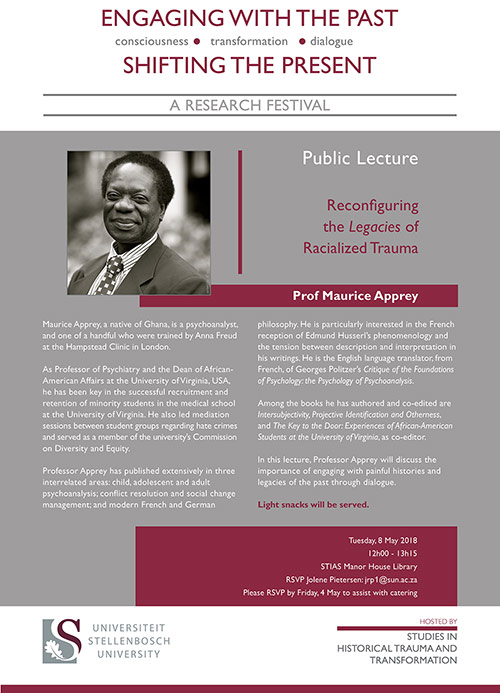
Abstract
Urgent
and [not “but"] paradoxically, voluntary errands bind us to our compatriots, or foes, past and present. Binding errands of
history, transformed into conscious or unconscious
contracts haunt us. These contracts are delegated and
redelegated into endless and circular chains of continuity. Upon the
consolidation and ossification of these contracts we arrive at an
aporia, a
dead end.
A new ethic of responsibility is required of us. It starts with coming to grips with
history and its unmetabolised sedimentations, a new consciousness of
unproductive transformations of history, and a
creative
reconfiguration
of ancestral wishes, demands and missions.
Enter the treaties of Westphalia to
introduce the idea of sovereignty and the Berlin Conference to introduce
the idea of colonization without sovereignty of the indigenous people.
Continue with entrenchment, struggles for freedom and unproductive
public policy initiatives. Then begin the processes of individual and
group transformation so that we can upend our toxic legacies.
The writer James Baldwin provides us
with poetic renditions of history, the intertwining between
transgressors and transgressed that end in an impasse. This we must do
so that we may see clearly.
Let us, finally, begin to come to
grips, through dialogue and intentional design, with painful history,
episodes of gratuitous hatred, painful love, and unproductive circular
efforts to change our destiny and begin the process of creating new
possibilities for authentic and transformative interventions.
 Events Poster
(Click here link to download)
Events Poster
(Click here link to download)
-------------------------------------------------------------------------------------------------------------------------------------------------------------
SEMINAR SERIES
Social Neuroscience and Intergroup Relations
MAY 9
How the Brain Can Change the Mind: A Neuroscience Based Approach to Prejudice Reduction.
Dr Emile Bruneau, Director of the Peace and Conflict Neuroscience Lab at the University of Pennsylvania, USA.
Time: 12h15 - 13h30
Venue: Perold Building on the Rooi Plein, 1st Floor, Room 1018
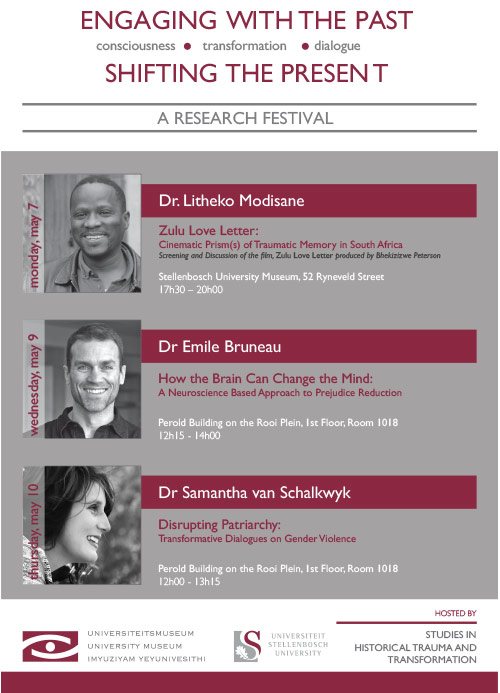
Dr. Emile Bruneau
Dr. Emile Bruneau is director of
the Peace and Conflict Neuroscience Lab at the University of
Pennsylvania, and lead scientist of the Beyond Conflict Innovations Lab.
Prior to his formal training in neuroscience, Dr. Bruneau worked,
traveled and lived in a number of conflict regions, including South
Africa, Sri Lanka, and Ireland. Dr. Bruneau is now working to bring the
tools of science to bear on the problem of intergroup conflict by (1)
building methods to assess the ways in which we demean, dehumanize and
withhold empathy from ‘the other’, and (2) creating and critically
evaluating interventions aimed at transcending these biases. His lecture
will be based on critical insights gained from this programme of
research.
 Events Poster
(Click here link to download)
Events Poster
(Click here link to download)
Dr Melike Fourie, Senior Researcher, Historical Trauma and Transformation. Stellenbosch University.
Walking in Another's Shoes: Empathy and perspective taking in second generation South African Students.
Time: 14h15 - 14h45
Venue: Perold Building on the Rooi Plein, 1st Floor, Room 1018
Alea Skwara, Doctoral Fellow Researcher, Historical Trauma and Transformation. Stellenbosch University.
From the Self to the Social: Contemplative Practice as a Path to Compassion.
Time: 14h45 - 15h15
Venue: Perold Building on the Rooi Plein, 1st Floor, Room 1018
MAY 10
Dr Samantha van Schalkwyk, Senior Researcher, Historical Trauma and Transformation. Stellenbosch University.
Disrupting
Patriarchy: Transformative Dialogues on Gender Violence
Time: 12h00-13h15
Venue: Perold Building on the Rooi Plein, 1st Floor, Room 1018
Adebayo Sakiru, Doctoral fellow in the Department of African Literature, University of the Witwatersrand.
The Inheritance of Loss:
Half of a Yellow Sun as a Postmemorial Narrative'
Time: 14h15-15h00
Venue: Perold Building on the Rooi Plein, 1st Floor, Room 1018
-------------------------------------------------------------------------------------------------------------------------------------------------------------
SEMINAR SERIES
Dialogue on Race and Citizenship
MARCH 2
Policing the Black Man: Conversation about Race in the United States.
Professor Angela J, Davis, Law Faculty, Washington College of Law, American University.
Time: 12h15 - 13h30
Venue: Stellenbosch University Library, JS Gericke Library Auditorium

 Seminar Brochure (Click on the link to download the seminar brochure)
Seminar Brochure (Click on the link to download the seminar brochure)
MARCH 7
Professor Christi van der Westhuizen, Department of Sociology, University of Pretoria
Rethinking Intersectionality: Race, Gender and White Afrikaans Women
At the Perold Building, Rooi Plein
Speaker: Christi van der Westhuizen
Date: Wednesday 7 March, 2018
Time: 12:15 p.m. to 13:30 p.m.
Venue:
Room 1018
First Floor
Perold Building on the Rooi Plein
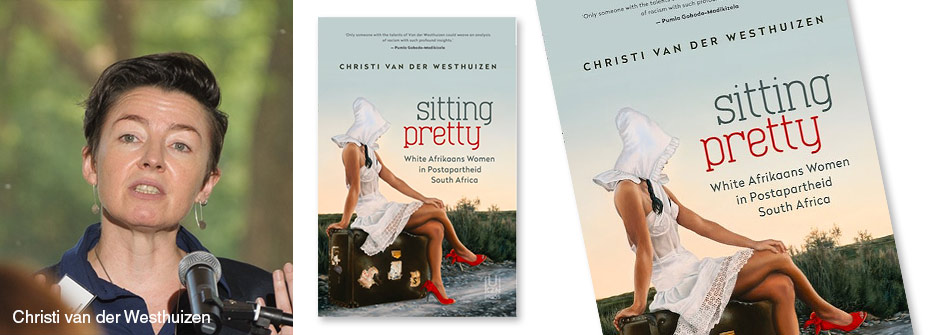
 Seminar Brochure (Click on the link to download the seminar brochure)
Seminar Brochure (Click on the link to download the seminar brochure)
MARCH 14
Professor Melissa Steyn, Director, Wits Centre for Diversity Studies, Wits University
Whiteness and Ignorance in Contemporary South Africa
At the Perold Building, Rooi Plein
Speaker: Melissa Steyn
Date: Wednesday 14 March, 2018
Time: 12:15 p.m. to 13:30 p.m.
Venue: Room 1018,
First Floor Perold Building on the Rooi Plein

 Seminar Brochure (Click on the link to download the seminar brochure)
Seminar Brochure (Click on the link to download the seminar brochure)
----------------------------------------------------------------------------------------------------------------------------------------------------
Research Meetings/ Event
Professor Homi Bhabha visit 15-16 August 2017.
In August we co-hosted (with Indexing Transformation and the NIHSS) a visit by Homi Bhabha, director of the Mahindra Humanities Centre
at Harvard University. We organized a series of events that were
planned around a two-pronged goal. First, we wanted to use Professor
Bhabha's visit as an occasion for campus-wide interdisciplinary
discussions among Stellenbosch University academic staff, emerging
researchers such as post-doctoral fellows, post-graduate and
under-graduate students, and members of the public. A second strategic
goal of our planning was to draw attention to the important and unique
role that the Humanities can play in debates about some of the most
pressing issues in South African society. Ultimately, as a research
initiative whose goal is to create conversations that invite
participation from a range of disciplines, we wanted to create space for
the exchange of ideas and to show case how we might bring the
Humanities into dialogue with the Arts. Homi Bhabha's programme
consisted of three main events: Engaged Scholarship and Ethical Citizenship; Art as Visual Conscience of Society; Dialogue, Writing, and Humanity in Troubled Times.
Engaged Scholarship and Ethical Citizenship
This
event was organized on Homi Bhabha's first day as our guest. We invited
him to lead a conversation with faculty, post-doc fellows and senior
post-graduate students on the theme of Engaged Scholarship and Ethical
Citizenship. "Decolonisation" and debates about colonialism's legacies
and issues around decolonising the curriculum have occupied the public
discourse space in South Africa since the emergence of "the fallist"
students' movements (i.e., #RhodesMustFall, #FeesMustFall protests). We
knew that Homi Bhabha would introduce a broader perspective in these
debates and that his insights would open up the space for an exchange of
ideas through vibrant dialogue and interpretation. The event was
organized as a reading group based on Homi Bhabha's Foreword to Frantz
Fanon's The Wretched of the Earth, which is titled “Framing Fanon." Buhle Zuma facilitated the conversation.

(From left to right, Dr Buhle Khanyile, Professor Homi Bhabha and Dr Kim Wale chairing the session)
The series includes the piece,
It's a pleasure to meet you,
a conversation between Candice Mama and Siyah Mgoduka, two young people
in their twenties who had not met before, but both of whom had lost
their fathers to assassinations by apartheid security police, and how
each of them respond differently to their fathers' killer.



(From left to right, Professor Tamar Garb and Professor Homi Bhabha, Professor Pumla Gobodo-Madikizela with Siyah Mgoduka and Candice Mama)
On
the 16 August 2017, two renowned scholars, Professor Homi Bhabha, who
is the world's premier post-colonial literary theorist and Director of
the Mahindra Humanities Center at Harvard University, and Emeritus
Professor Njabulo Ndebele, Chairman of the Nelson Mandela Centre of
Memory, poet, novelist and essayist who has received worldwide acclaim
for his work, joined together with Professor Pumla Gobodo-Madikizela to
discuss 'Dialogue, Writing, Humanity in Troubled Times'. Professor Homi
Bhabha and Emeritus Professor Njabulos Ndebele are known to integrate
academic inquiry with public engagement, extending themselves well
beyond scholarly concerns to challenge the status quo in troubled times.
Professor
Homi Bhabha and Emeritus Professor Njabulo Ndebele introduced how their
upbringing and the surrounding social and political climate shaped
their interest and conscientisation of the social and political. Further
how spaces create ethical and political life that informs the value
placed on humanity.

(from left to right; Professors,
Nico Koopman, Pumla Gobodo-Madikizela, Wim De Villiers, Njabulo
Ndebele, Mrs Catherine De Villiers, Professor Homi Bhabha and Eugene Cloete)
An
interactive conversation hosted by Professor Pumla Gobodo-Madikizela
between Professor Njabulo Ndebele and Professor Homi Bhabha as the
pictures show below.




For
three Thursdays during March 2017, Studies in Historical Trauma and
Transformation hosted a series of open conversations on race.
These
public conversations were led by coloured, black and white women who
have maintained sustained conversation about race and racism, grappling
with experiencing the reality of race as it plays out in their
relationship with one another. Our interest in these dialogue processes
is in learning about the potentially transformative moments that emerge
from the women’s encounter with “the other,” and to understand some of
the deeper issues that are difficult to face in conversations about
race.
Click below to view video clips of each of the series:
Open Dialogues on Race (Conversation 3) - Tumi Jonas-Mpofu in conversation with Martina Dahlmanns

Open Dialogue on Race Series - Conversation 3 (From left to right: Tumi Jonas-Mpofu; Tumi and Martina Dahlmanns)
Open Dialogues on Coloured Identity (Conversation 2)
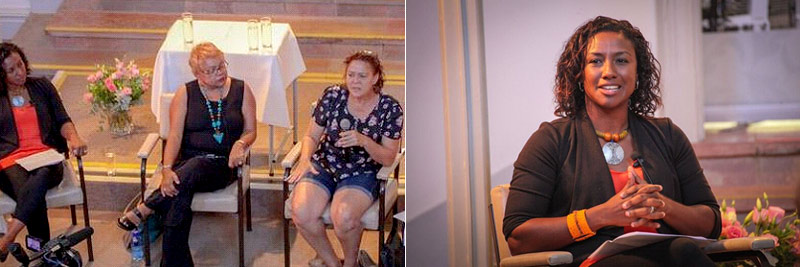
Open Dialogue on Race Series - Conversation 3 (LEFT PHOTO: From left to right: Dr Lane Benjamin; Debora Platen; photo: Khadija Heeger)
(RIGHT PHOTO: Dr Lane Benjamin)

Open Dialogue on Race Series - Conversation 3 - Audience
Open Dialogues on Race (Conversation 1): "Kim Wale in conversation with
Mosa Phadi"

Open Dialogue on Race Series - Conversation 1 (Image 1: From left to right: Dr Kim Wale, Mosa Phadi, Prof Pumla Gobodo-Madikizela)
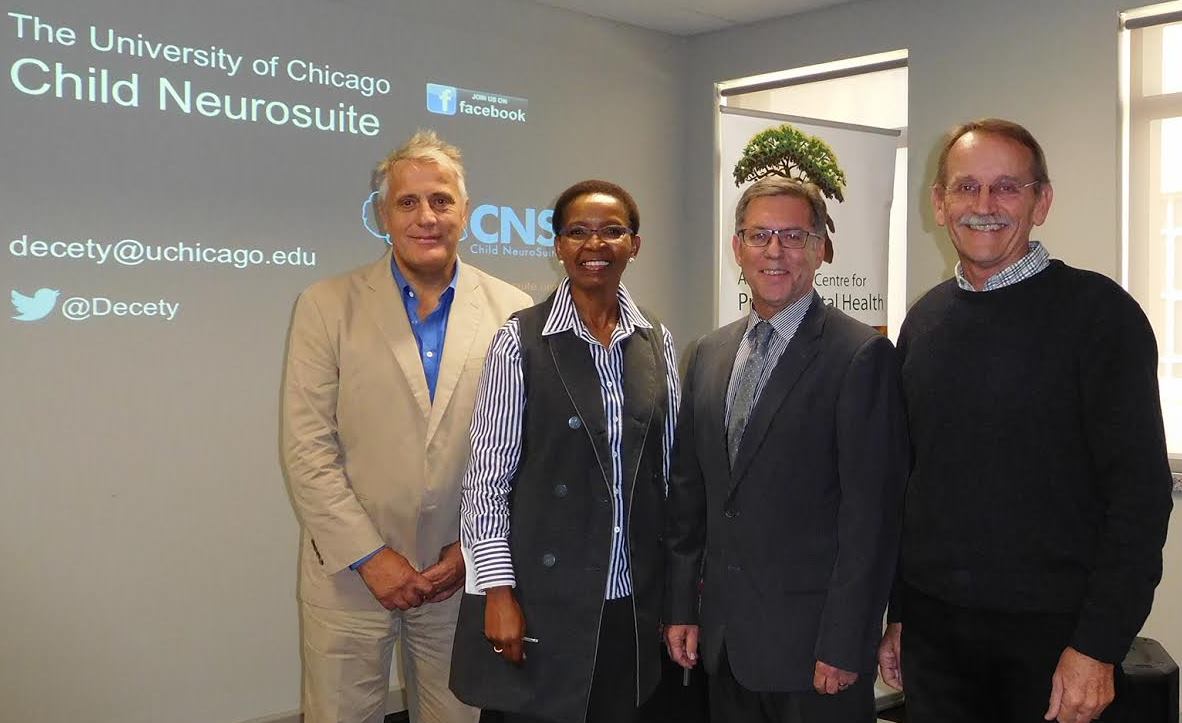
Professors Jean Decety, Pumla Gobodo-Madikizela, Eugene
Cloete, and Awie Greef. Professor Jean Decety, Irving B. Harris
Professor of Psychology and Psychiatry at the University of Chicago. He
is a leading scholar on the social neuroscience of empathy, morality and
prosocial behavior, and gave a lecture titled "Moral Progress, Empathy
and Reason: A Social Neuroscience Perspective"
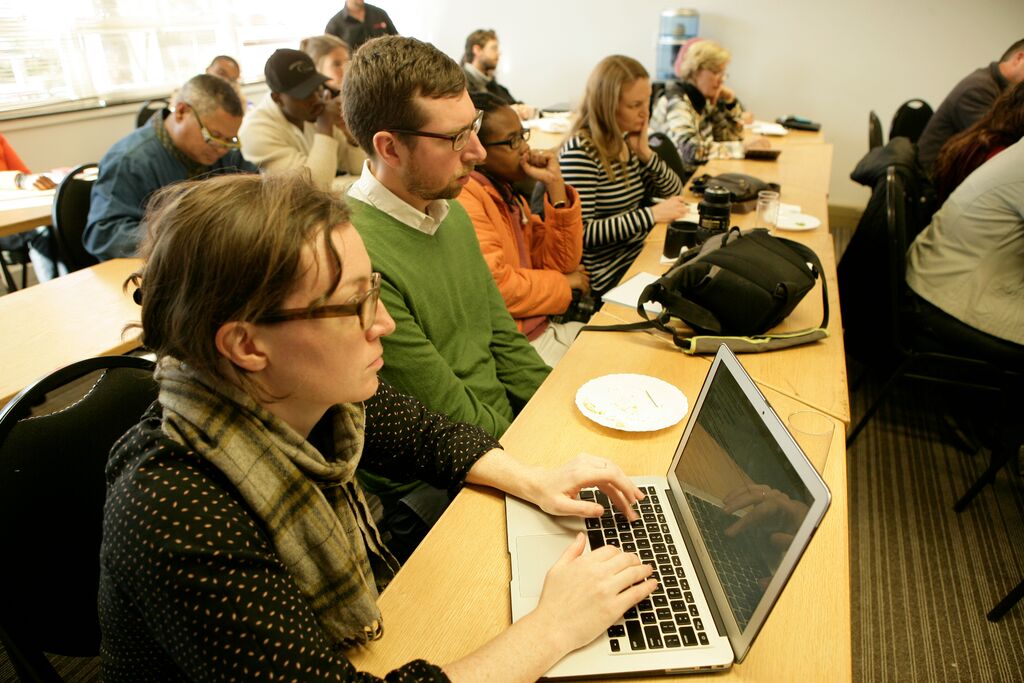
Symposia/Conferences:
Symposia and
conferences are an important opportunity to keep abreast of current
thinking and the latest developments in one's area of research. Through
conferences and symposia, our aim is to bring together leading scholars
and emerging researchers to explore the various dimensions of our
research agenda: historical trauma and memory in global context and the
interconnected issues of intergenerational trauma and memory in the
aftermath of mass trauma and violence; empathy and its relation to
transformation; and violence and its impact on gender relationships.
Symposium, 10-12 August 2016
Historical Trauma and Memory: Postcolonial Legacies and the Meaning of Being Human
This symposium
was held at Stellenbosch University on 10 – 12 August 2016. It brought
together a small group of scholars from different disciplinary
backgrounds to consider mainly two critical questions. The first
question concerns how post conflict/postcolonial subjectivity in social
interaction may be shaped by traumatic pasts. A second goal of the
symposium was to probe the question of what it means to restore humanity
in the aftermath of mass violence and trauma. In other words, what are
the values, practices and traditions we might draw from in order to
aspire to a present and future different from a past that destroyed the
very essence of what it is to be human.
You may view the symposium report
here.
Exhibition of Researchers' Work
In November 2016,
students and post-doctoral fellows presented an exhibition of the
prolific flourishing for the interdisciplinary projects they have been
working on. We hosted an end-of-year event to showcase this range of
work, which included the launch of books authored by Dr Kim Wale, Dr
Samantha van Schalkwyk (as co-editor with Prof Pumla Gobodo-Madikizela),
and PhD student Naleli Morojele. Projects that bring together the Arts
into dialogue with Humanities research were a Photo-Voice exhibition
based on research conducted by PhD student Lerato Machetela, and a
dramatic/theatre presentation of a story of the legacy of trauma and
violence experienced by women working on farms. The play was directed by
Michelle Hoffman, a Masters student.
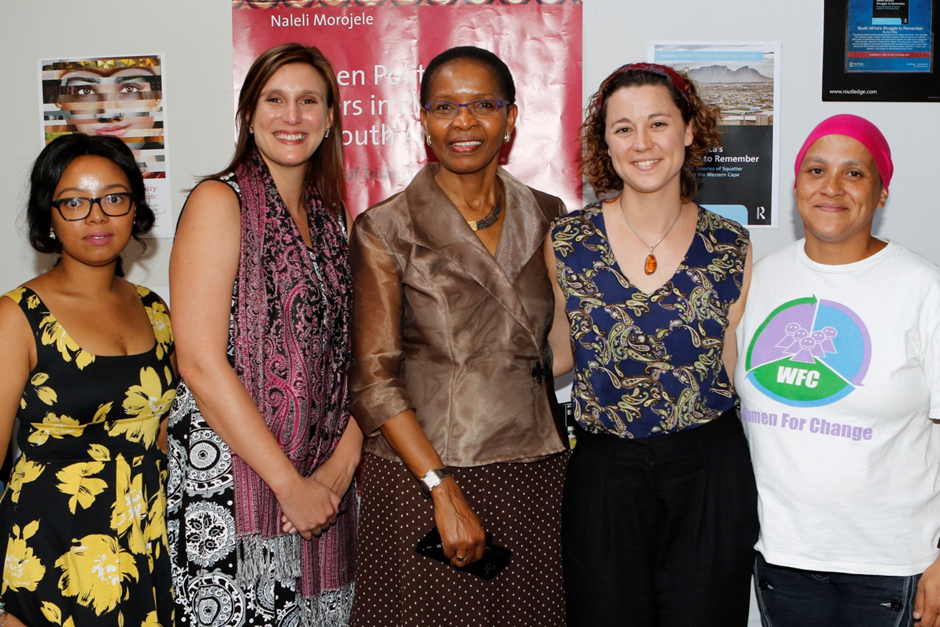
Standing in front of the images of the books that were
launched are from the left are: Naleli Morojele (PhD student), Dr
Samantha van Schalkwyk (Senior Researcher), Prof Pumla
Gobodo-Madikizela), Dr Kim Wale (post-doctoral fellow), and Faeza Meyer
(Housing rights activist and one of the speakers at the launch of the
books).
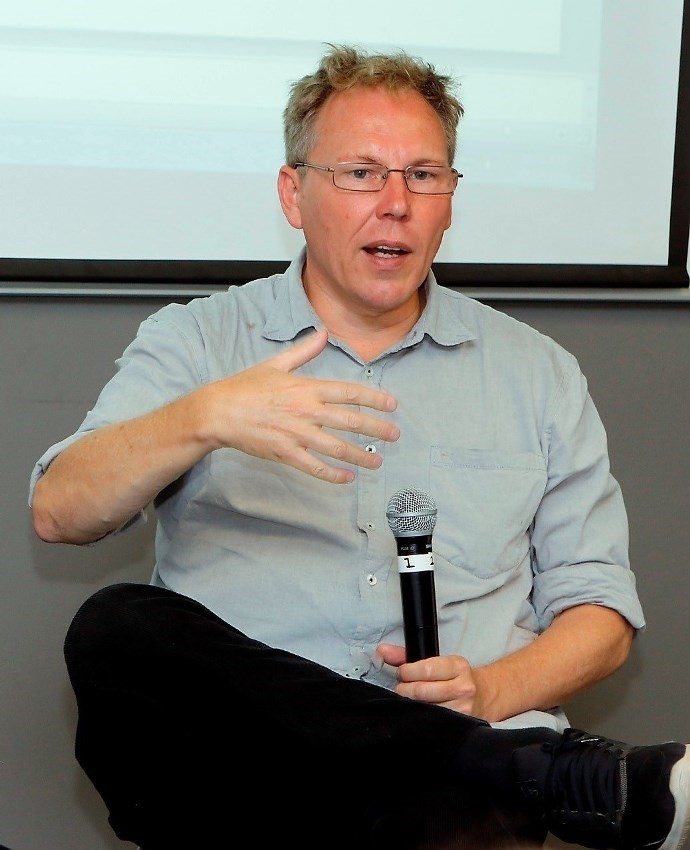
Professor Anthony Collins, Keynote speaker at the launch of the resarchers’ books.
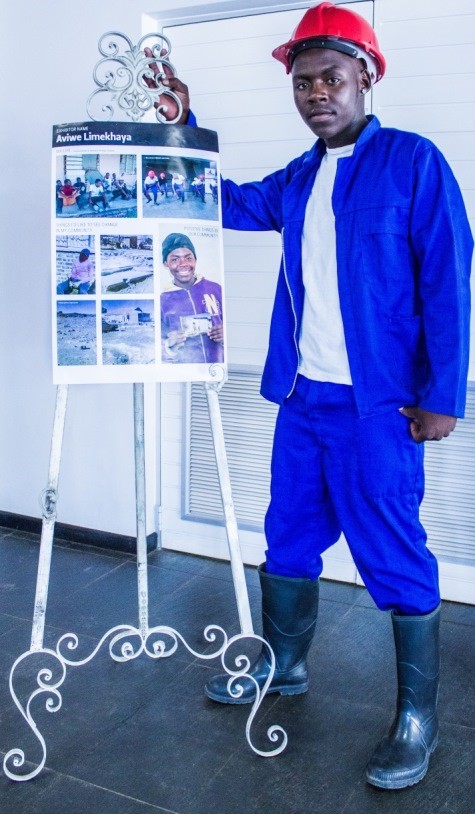
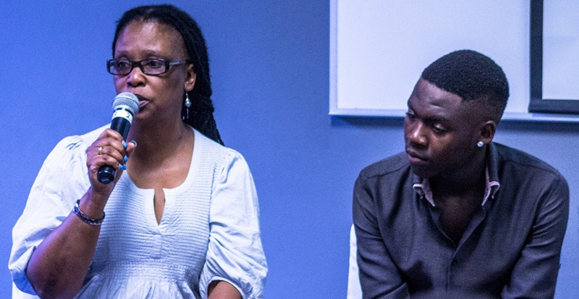
Photo-Voice Exhibition: Aviwe Lemekhaya with
Ms Letshego Moathlodi (CEO Diamant Hospital in Jagersfontein) and Aviwe Lemekhaya (one of the
his poster with photographs of his community in Jagersfontein participants in the PhotoVoice
Research project an member of the young men’s group,
“Diamonds in the Rough” Who performed at the event).
Exploring Intergroup Empathy and its Limits: An Interdisciplinary Symposium
On
4-5 May, Historical Trauma and Transformation hosted a symposium on
intergroup empathy that brought together professional practitioners,
scholars, and emerging researchers from different branches in psychology
(including social psychology, psychoanalysis, social neuroscience, and
cognitive neuroscience). The goal was to engage a multidisciplinary
approach to explore the psychological mechanisms that play out in
intergroup relations, with a particular focus on empathy (and also its
limitations) in the context of interracial interactions. Dr Melike
Fourie, who was partly responsible for organising the symposium, also
used the event to spearhead social neuroscience in South Africa as an
emerging discipline that shows rich promise in enhancing our
understanding of complex social phenomena. Together with Professor Mark
Solms from UCT, she delivered a public lecture entitled “Social neuroscience and its contribution to understanding complex social issues in contemporary South Africa."
The
keynote lecture was delivered by Dr Emile Bruneau, head of the Peace
and Conflict Neuroscience Lab at the University of Pennsylvania. In his
talk, “Putting social neuroscience to work for peace", he
examined the processes that drive discrimination and intergroup
conflict, focusing on how the methods of social neuroscience could help
to identify and characterise the (often unconscious) cognitive biases
that drive conflict. Other presenters and contributers at the symposium
included Dr Lane Benjamin, Prof Kevin Durrheim, Monica du Toit, Prof
Ernesta Meintjes, Dr Lidewij Niezink, Prof Desmond Painter, Dr Katherine
Train, Dr Ross Truscott, Dr Buhle Zuma, Dr Kim Wale, and Prof Pumla
Gobodo-Madikizela.
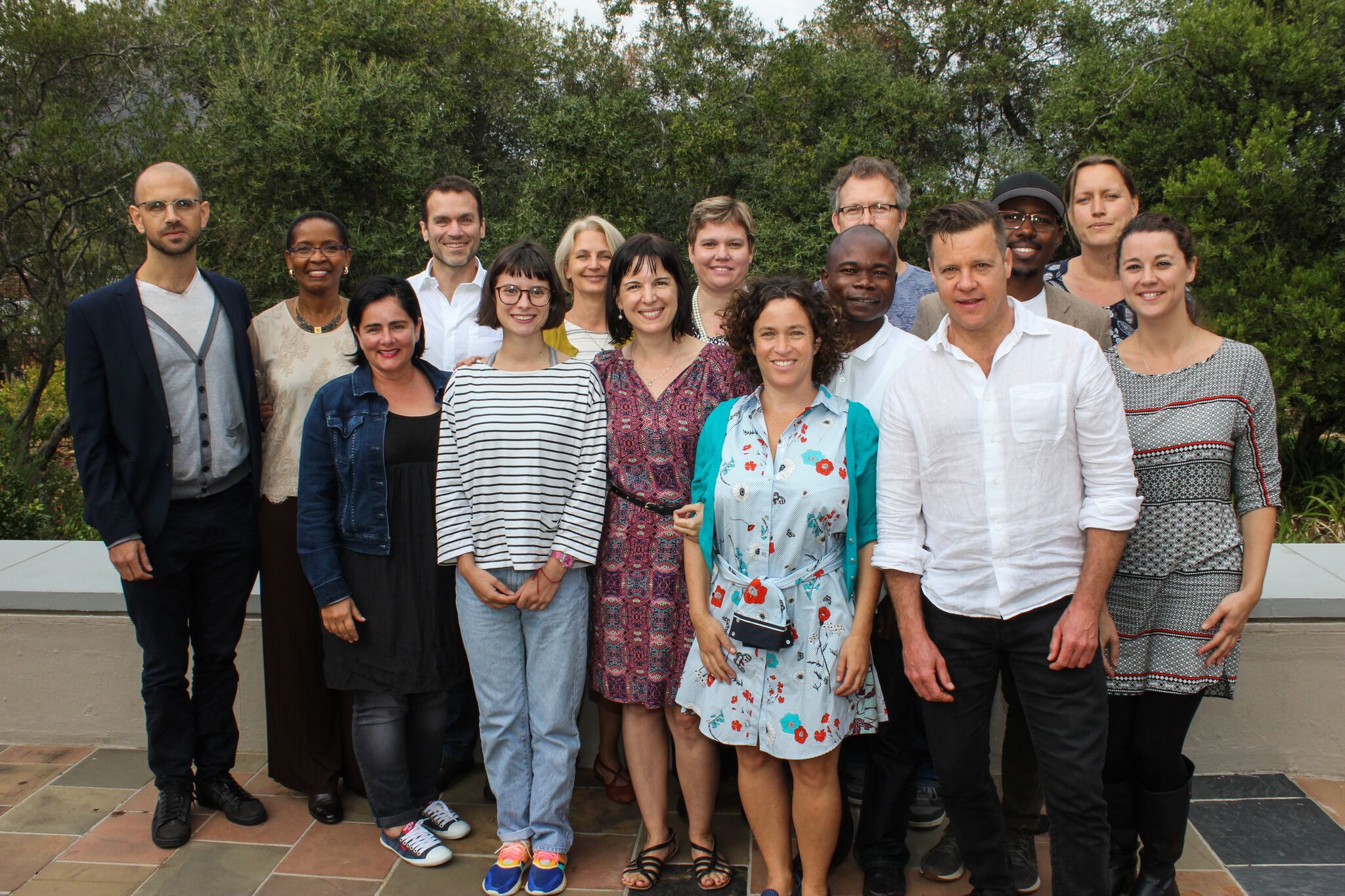
Troubling the Haunting Power of the Past; Interrupting Intergenerational Cycles of Historical Trauma
An
Interdisciplinary Symposium was hosted by Historical Trauma and
Transformation and Queens University on the 15-16 May 2017. This
interdisciplinary symposium was a dialogue between scholars from
Northern Ireland and South Africa. It aimed to examine the connection
between historical trauma and memory, and to illuminate how this
relationship plays out in the public and private realms in societies
with a history of violent pasts. Discussions in the symposium engaged
with, and reflected on the established theoretical tenets that inform
global scholarship on the central themes of the symposium. The symposium
also served to interrogate theory in order to address critical
questions regarding the challenges of societal and individual
transformation in post-apartheid South Africa and in the aftermath of
the “troubles" in Northern Ireland. With a multidisciplinary approach,
including the arts (visual arts, film and theatre), the symposium
intended to start a dialogue between scholars from the two countries,
through the exploration of new intellectual frontiers within the buzzing
hub of scholarly debates on historical trauma, and what healing might
mean in its aftermath. The starting point of the discussion was that the
Humanities and the Arts are more essential than ever, to help us
understand the challenges facing societies affected by historical
trauma, to advance scholarship, and to contribute to new knowledge
production that inform public opinion and guide us to solutions.
The
keynote lecture was delivered by Professor John Brewer from the Senator
George Mitchell Institute for Global Peace, Security and Justice. In
his talk, 'Rethinking Victim Issues', he conceptualised victims
as moral beacons within societies and how the victimhood experience
itself provokes a moral response that is rooted in a 'relational ethic',
which is outworked in most victims through emotional empathy,
compassion and the wish to 'get along'. A public lecture was given by
Dr Emery Kalema a Post-Doctor Fellow from the Studies in Historical
Trauma and Transformation with Nomfundo Mogabi, Director of Centre for
the Study of Violence and Reconciliation. Dr Emery Kalema gave his
lecture on 'Congolese Political Regimes and the Politics of Forgetting' and Nofundo Mogabi gave her lecture on 'Post-Apartheid Traumatic Legacies and Violence'.
Other presenters and contributors of the Symposiom included, Professor
Annemiek Ritchers, Professor Kopano Ratele, Professor Hastings Donnan,
Professor Jaco Bernard Naude, Dr Cheryl Lawther, Dr Lane Benjamin, Dr
Buhle Zuma, Dr Kim Wale and Professor Pumla Gobodo-Madikizela.
